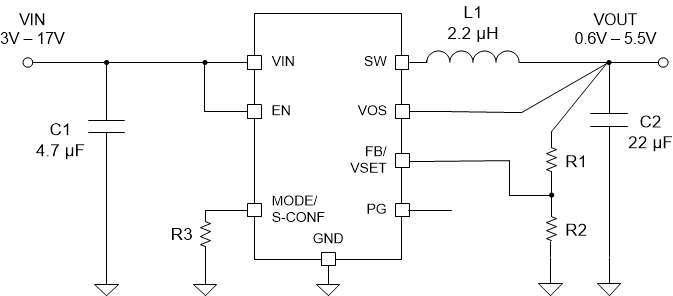SLVSGE0B August 2021 – January 2022 TPS629210
PRODUCTION DATA
- 1 Features
- 2 Applications
- 3 Description
- 4 Revision History
- 5 Device Comparison Table
- 6 Pin Configuration and Functions
- 7 Specifications
-
8 Detailed Description
- 8.1 Overview
- 8.2 Functional Block Diagram
- 8.3
Feature Description
- 8.3.1 Mode Selection and Device Configuration (MODE/S-CONF Pin)
- 8.3.2 Adjustable VO Operation (External Voltage Divider)
- 8.3.3 Selectable VO Operation (VSET and Internal Voltage Divider)
- 8.3.4 Smart Enable with Precise Threshold
- 8.3.5 Power Good (PG)
- 8.3.6 Output Discharge Function
- 8.3.7 Undervoltage Lockout (UVLO)
- 8.3.8 Current Limit and Short Circuit Protection
- 8.3.9 Thermal Shutdown
- 8.4 Device Functional Modes
- 9 Application and Implementation
- 10Power Supply Recommendations
- 11Layout
- 12Device and Documentation Support
- 13Mechanical, Packaging, and Orderable Information
Package Options
Mechanical Data (Package|Pins)
- DRL|8
Thermal pad, mechanical data (Package|Pins)
Orderable Information
9.2 Typical Application
 Figure 9-1 Typical Application Setup
Figure 9-1 Typical Application SetupTable 9-1 List of Components
| REFERENCE | DESCRIPTION | MANUFACTURER |
|---|---|---|
| IC | 17-V, 1-A Step-Down Converter | TPS629210; Texas Instruments |
| L1 | 2.2-µH inductor | XGL3530-222; Coilcraft |
| C1 | 4.7 µF, 25 V, Ceramic, 1206 | C3216X7R1E475K160AC, TDK |
| C2 | 22 µF, 6.3 V, Ceramic, 0805 |
GCM21BD70J226ME36L, MuRata |
| R1 | Depending on VOUT; see Section 9.2.2.2. | Standard 1% metal film |
| R2 | Depending on VOUT; see Section 9.2.2.2. | Standard 1% metal film |
| R3 | Depending on device setting, see Section 8.3.1. | Standard 1% metal film |